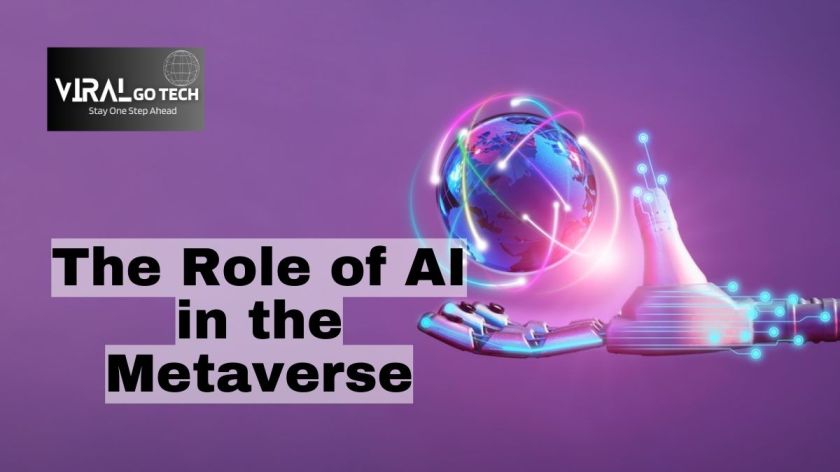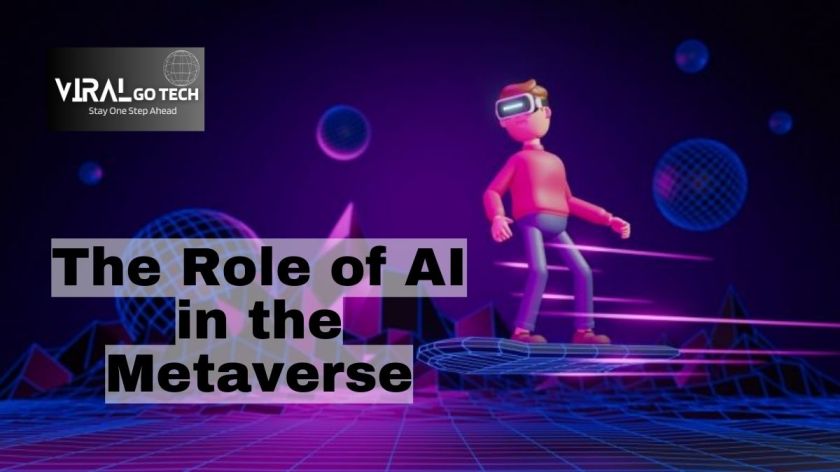
The fast technological breakthroughs have taken us to the threshold of a new era – the Metaverse. A phrase coined by science fiction writer Neal Stephenson in his novel “Snow Crash,” the Metaverse refers to a virtual place where individuals can interact with each other and digital things in a three-dimensional environment. This immersive and linked virtual world holds tremendous potential for numerous businesses and is one of the primary driving forces behind The Role of AI in the Metaverse.
Table of Contents
Introduction to the Metaverse
The Metaverse is an idea that has grabbed the imagination of technologists, futurists, and gamers alike. It is a digital domain where individuals can explore, create, and interact with others in a virtual environment that goes beyond the boundaries of the physical world.
In the Metaverse, users can don virtual reality headsets or use augmented reality gadgets to immerse themselves in a fully interactive and dynamic universe.
What is AI (Artificial intelligence) ?
Artificial intelligence, or AI, refers to the simulation of human intelligence in robots that are programmed to think and learn like humans. AI encompasses a wide range of technologies, including machine learning, natural language processing, computer vision, and robotics.
These technologies enable robots to execute jobs that traditionally require human intelligence, such as speech recognition, decision-making, problem-solving, and even creative endeavors.
The intersection of AI and the Metaverse
The Metaverse and AI are intrinsically intertwined, as AI plays a critical role in powering the virtual experiences and interactions within the Metaverse. AI algorithms and models enable the construction of intelligent virtual entities, dynamic environments, and realistic simulations.
By utilizing AI, the Metaverse can provide consumers with individualized and immersive experiences, making the virtual world feel more lifelike and responsive.
What is the contribution of artificial intelligence (AI) in the Metaverse?
AI’s contribution to the Metaverse is varied. First and foremost, AI permits the creation of virtual creatures that can interact with consumers realistically and intelligently.
These virtual entities, powered by AI algorithms, can interpret normal language, learn from user interactions, and alter their behavior accordingly. This generates a sense of presence and social interaction within the Metaverse, making it feel like a live, breathing planet.
AI-powered virtual beings in the Metaverse
AI-powered virtual creatures are one of the most fascinating applications of AI in the Metaverse. These virtual entities can take on many functions, such as virtual assistants, companions, or even performers.
They can engage in conversations, deliver information, and entertain consumers through interactive experiences.
AI enables virtual creatures to comprehend user preferences, anticipate their requirements, and make personalized recommendations, boosting the overall user experience in the Metaverse.
AI-driven virtual experiences in the Metaverse
AI also plays a significant role in producing immersive and dynamic virtual experiences in the Metaverse. Through AI algorithms, virtual environments can be inhabited by sentient NPCs (non-player characters) who can react to user actions and create a sense of realism.
AI can also provide realistic physics simulations, dynamic weather patterns, and lifelike animations, making the virtual world feel more colorful and interactive.
AI’s impact on the economy of the Metaverse
AI can alter the economics of the Metaverse. By exploiting AI-powered virtual beings and experiences, organizations may develop new revenue streams and monetize their presence in the virtual world.
Virtual beings can be designed to sell companies and services, provide customer care, and even generate content. AI systems can also evaluate user behavior and preferences to give tailored adverts and recommendations, further enhancing the economic potential of the Metaverse.
Ethical Considerations of AI in the Metaverse
While AI can enhance the Metaverse, it also brings ethical problems. As AI-powered virtual beings become more sophisticated and lifelike, problems arise concerning permission, privacy, and ownership.
The interactions between virtual creatures and users may blur the barriers between reality and fiction, leading to significant ethical concerns. It is necessary to establish standards and regulations to ensure the responsible use of AI in the Metaverse, protecting the rights and well-being of users.

The Role of AI in the Metaverse
Artificial intelligence (AI) will play a vital role in the construction and functioning of the metaverse. AI will offer different features that enhance user experiences, automate processes, and construct intelligent virtual worlds.
Here are some concrete instances of how AI is being employed in the metaverse today:
Creating realistic avatars: AI is being utilized to produce realistic avatars that can replicate human facial expressions and body movements. This helps to create a more immersive experience for consumers.
Generating realistic virtual environments: AI is being used to build realistic virtual environments that can include realistic physics, lighting, and sound effects. This helps to create a more believable and engaging experience for users.
Powering virtual assistants and chatbots: AI is being used to power virtual assistants and chatbots that may aid users with tasks such as navigation, booking appointments, and locating information. This can help to make the metaverse more user-friendly and accessible.
Personalizing user experiences: AI is being utilized to personalize user experiences in the metaverse. For example, AI can be used to offer new material and experiences to users based on their interests and past behavior.
Automating various duties: AI is being utilized to automate numerous functions in the metaverse, such as filtering material, identifying and preventing fraud, and maintaining security. This can assist in making the metaverse a safer and more pleasurable place for users.
In addition to these specific examples, AI is also being used to generate new and unique ways to interact with and enjoy the metaverse.
The Rise of Metaverse Farming Games
Challenges and barriers to AI adoption in the Metaverse
There are a variety of obstacles and barriers to AI adoption in the Metaverse, including:
Technical challenges: AI systems are sophisticated and require substantial hardware and software resources to run. This can make it challenging to deploy and operate AI systems in the Metaverse, which is still under development.
Data challenges: AI systems need enormous amounts of data to train and operate successfully. However, the Metaverse is a new and emerging platform, and there is currently a shortage of high-quality data that is expressly tailored for AI applications.
Privacy and security challenges: AI systems can gather and process vast volumes of personal data. This raises issues regarding privacy and security, especially in the Metaverse, where people are anticipated to interact with AI systems in a more immersive and personal way.
Ethical challenges: The employment of AI in the Metaverse creates a variety of ethical concerns, such as the possibility of bias and discrimination, the loss of control over personal data, and the introduction of new and unanticipated risks.
In addition to these fundamental obstacles, there are also several unique impediments to AI adoption in the Metaverse, such as:
Lack of standards: There is presently no globally approved set of standards for designing and deploying AI systems in the Metaverse. This can make it challenging for corporations and organizations to invest in and create AI applications for the Metaverse.
Lack of experience: There is a shortage of skilled AI specialists who have the expertise to create and deploy AI systems for the Metaverse. This might make it challenging for corporations and organizations to find the talent they need to apply AI technologies.
High costs: The development and deployment of AI systems can be expensive. This can be a barrier for small enterprises and organizations who want to deploy AI in the Metaverse.
Despite these problems and barriers, there is a growing interest in deploying AI in the Metaverse. As the Metaverse continues to expand and mature, we can expect to see more and more businesses and organizations utilize AI to improve the user experience and build new and innovative goods and services.
How does AI contribute to creating a Metaverse?
AI contributes to establishing a Metaverse by enabling intelligent interactions, dynamic surroundings, and lifelike simulations. Through AI algorithms, virtual entities can interpret and respond to user input, generating a sense of presence and social interaction.
AI also powers the development of realistic physics simulations, dynamic weather patterns, and lifelike animations, making the virtual world come alive. By employing AI, the Metaverse can provide users with tailored and immersive experiences, pushing the frontiers of what is possible in a virtual environment.
A Guide on How to Use Metaverse in Education
Why is AI important for the Metaverse?
AI is vital for the Metaverse because it adds a layer of intellect and interactivity to the virtual world. Without AI, the Metaverse would be a stagnant and lifeless environment, devoid of intelligent interactions and dynamic experiences.
AI-powered virtual people and experiences make the Metaverse feel more lifelike and responsive, improving user engagement and enjoyment.
Additionally, AI can fuel the economic expansion of the Metaverse by enabling new business models and revenue streams.
How Can Artificial Intelligence fit in the Metaverse?
Artificial intelligence fits into the Metaverse by providing the underlying technology that powers intelligent interactions and dynamic experiences.
AI algorithms and models enable virtual entities to interpret normal language, learn from user interactions, and adjust their behavior.
AI also permits the production of realistic physical simulations, dynamic weather patterns, and lifelike animations. By employing AI, the Metaverse can provide consumers with a completely immersive and dynamic virtual world.
The future of AI in the Metaverse
The future of AI in the Metaverse is optimistic. As AI technologies continue to progress, we can expect more intelligent and lifelike virtual creatures, dynamic landscapes, and realistic simulations.
AI will play a significant role in boosting the user experience, spurring economic growth, and pushing the boundaries of what is possible in the Metaverse. However, it is vital to address the ethical considerations and challenges involved with AI adoption to maintain a responsible and inclusive Metaverse.
What are the Principles for Responsible Use of AI in Metaverse?
The Principles for Responsible Use of AI in the Metaverse serve as a guide for ensuring the ethical and responsible deployment of AI technologies. These principles include transparency, accountability, fairness, privacy, and safety.
Transparency ensures that users are aware of AI systems operating in the Metaverse and understand their capabilities and limitations. Accountability holds developers and operators responsible for the actions and behavior of AI-powered virtual beings.
Fairness ensures that AI systems do not discriminate or marginalize individuals based on their characteristics. Privacy safeguards users’ personal information and ensures their consent in AI interactions. Safety focuses on preventing harm to users and ensuring the security of AI systems in the Metaverse.
Conclusion
The Metaverse marks a new frontier in human-computer interaction, and artificial intelligence is at the forefront of developing this virtual reality. AI-powered virtual creatures and experiences offer a layer of intelligence and interactivity, making the Metaverse feel more lifelike and immersive.
However, the appropriate and ethical use of AI in the Metaverse is vital to address the issues and concerns related to this new technology. By employing AI responsibly, we can unlock the full potential of the Metaverse and create a virtual world that enriches the lives of its inhabitants.
FAQs
How does AI contribute to the economy of the Metaverse?
AI contributes to the economics of the Metaverse by helping firms to generate new revenue sources and monetize their presence in the virtual world. AI-powered virtual people can promote businesses and services, provide customer care, and generate content, boosting economic growth.
What are the challenges to AI adoption in the Metaverse?
The barriers to AI adoption in the Metaverse include processing power requirements, scalability, and interoperability of AI systems among multiple platforms and applications.
What are the ethical considerations of AI in the Metaverse?
Ethical implications of AI in the Metaverse include issues of permission, privacy, ownership, and the blurring of distinctions between reality and fiction.
How can AI fit into the Metaverse?
AI fits into the Metaverse by providing the underlying technology that supports intelligent interactions, dynamic surroundings, and lifelike simulations. AI enables virtual creatures to perceive and respond to user input, boosting the user experience.